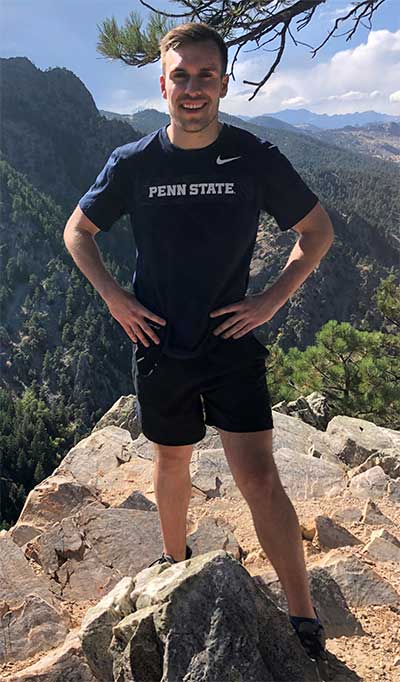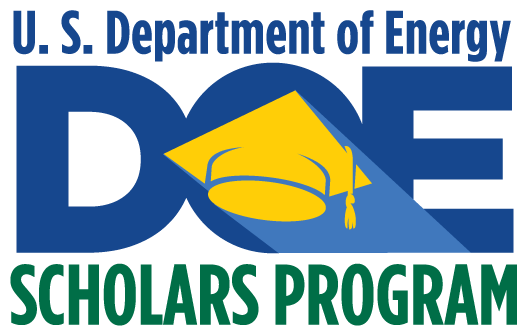Meet Gage Reber
A devastating flood in his hometown caused high school freshman Gage Reber of Riverside, Pennsylvania, to begin studying the effects of climate change on extreme weather events. With a strong aptitude for math and science, Reber researched viable pathways to decarbonize the environment and limit global warming. Several years later, these interests led to a bachelor’s degree in energy engineering at Pennsylvania State University.

A participant in the U.S. Department of Energy (DOE) Scholars Program, Gage Reber received environmental training at the National Renewable Energy Laboratory in Golden, Colorado. His appointment is with the Wind Energy Technologies Office in Washington, D.C. Photo credit: Raphael Tisch/WETO
After graduation from Penn State, Reber accepted an appointment with the U.S. Department of Energy (DOE) Scholars Program. Open to undergraduate and graduate students as well as recent graduates, the DOE Scholars Program is designed to help prepare participants for a full range of entry and mid-level research, technical and professional positions within DOE and organizations that support the DOE mission. Participants are assigned to research, technical or policy-related projects.
Reber serves his appointment at the Wind Energy Technologies Office (WETO) in Washington, D.C., and he is part of two program teams: Grid Integration and Modeling and Analysis. Under the direction of his mentor, Shane Beichner, WETO operations manager, Reber assists with research projects including those at National Renewable Energy Laboratory, Idaho National Laboratory and Lawrence Berkeley National Laboratory.
“In the Grid Integration Program, we focus on solving challenges and threats to wind energy, such as providing grid services that enhance the reliability and resiliency of the grid or bulk power system,” said Reber. “Other projects are based on stakeholder engagement and information dissemination. These projects are less technical, but equally important because they help inform the program of the current industry trends and challenges.”
Reber’s appointment allows time to do deep dives into specific aspects of the grid or wind integration. He researches new potential technologies and processes. One of the most rewarding research areas involves the Integrated Resource Planning Process, a key mechanism used by utilities to plan and procure energy resources to meet energy and transmission needs. He also researches Utility Blackstart practices, which outline the necessary plans, actions and regulations to ensure a safe and efficient restart after a partial or complete power blackout.
“These dives provide valuable information to the Grid Integration Team about important challenges facing wind energy,” said Reber. “We want to solve challenges and add clean wind energy to the grid.”
He participated in a wind environmental impacts training at the National Renewable Energy Laboratory in Golden, Colorado, where he completed a climb to the top of a wind turbine.
“It was an amazing experience,” Reber said. “From this vantage point, we became more aware of the environmental effects that are part of the wind plant planning process and the potential impacts to habitats from wind plants.”
During his appointment, Reber has developed valuable professional skills, including project management, time management and stakeholder engagement. He participated in multiple workshops at the Energy Systems Integration Group Spring Technical Conference, which featured various topics such as renewable energy systems integration, vehicle electrification and impacts on grid operations, and challenges of increasing penetration of inverter-based resources like wind energy. He attended the Congressional Operations Seminar. It provided insights into the appropriations, funding and budgeting process, which plays a crucial role in determining research project selection and requirements.
“I have also gained an immense understanding of current issues that stem from renewable energy integration. The WETO portfolio, which has more than 62 active projects, is at the forefront of developing and investing in new technologies that will help solve industry’s biggest challenges with grid reliability and resilience,” Reber said.
“I would recommend this program to any science, technology, engineering and math (STEM) graduates who feel like they need a year or two to refine professional skills and continue learning before they attend graduate school. This program has given me skills and knowledge that will help me get even more from graduate school.”
Upon completion of his appointment, Reber will attend graduate school to earn a degree in renewable energy systems integration or energy modeling.
The DOE Scholars Program is administered by Oak Ridge Associated Universities (ORAU) through the Oak Ridge Institute for Science and Education (ORISE) under an agreement with the U.S. Department of Energy (DOE).

